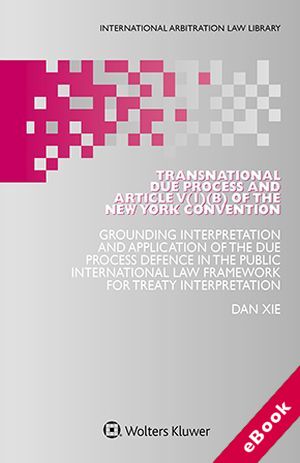
The device(s) you use to access the eBook content must be authorized with an Adobe ID before you download the product otherwise it will fail to register correctly.
For further information see https://www.wildy.com/ebook-formats
Once the order is confirmed an automated e-mail will be sent to you to allow you to download the eBook.
All eBooks are supplied firm sale and cannot be returned. If you believe there is a fault with your eBook then contact us on ebooks@wildy.com and we will help in resolving the issue. This does not affect your statutory rights.
Transnational Due Process and Article V(1)(b) of the New York Convention is a book that thoroughly examines the variety of approaches to the ‘due process’ clause adopted by different national courts along with a particular understanding of the transnational approach to the due process defence grounded in the interpretative framework of the Vienna Convention on the Law of Treaties. Widely regarded as the most crucial ground for refusal under the 1958 United Nations Convention on the Recognition and Enforcement of Foreign Arbitral Awards (New York Convention), Article V(1)(b), commonly referred to as the ‘due process’ clause, is interpreted in diverse ways across jurisdictions.
Drawing on insights and methods from comparative law that consider national legal systems, international commercial arbitration, and other international legal regimes, the author leverages explicitly the principle of audiatur et altera pars and subsequent state practice. Among the matters examined are the following:
The book comprises a detailed comparative analysis of numerous domestic judicial decisions across jurisdictions. A comprehensive bibliography provides references to cases, awards, treaties, UN Documents, legislation, institutional rules, and soft laws.
The book clearly shows how understanding transnational due process grounded in the interpretative framework mandated by international law can contribute to the uniform interpretation and application of Article V(1)(b), thus contributing to debates on domestic courts’ decentralised interpretation of international law. Resolving a range of practical questions about the precise content of the due process defence, arbitration professionals will greatly appreciate the book’s stable and principled framework for interpreting the due process defence. Judges will benefit from its endorsement of international judicial cooperation through the recognition and consideration of foreign court decisions, fostering a more harmonised interpretation of the New York Convention.